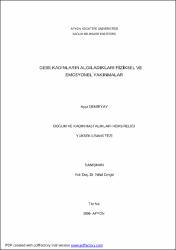Gebe Kadınların Algıladıkları Fiziksel ve Emosyonel Yakınmalar
Abstract
Bu araştırma gebe kadınların gebelik döneminde yaşadığı fiziksel ve
emosyonel yakınmaların belirlenmesi ve bunları etkileyen etmenlerin incelenmesi
amacı ile tanımlayıcı olarak planlanmıştır.
Araştırma Muğla ilinde SSK ve Devlet hastanelerinde ve 1 No’lu sağlık
Ocağında 27 Eylül 2004- 07 Mart 2005 tarihleri arasında gerçekleştirilmiştir.
Araştırmanın evrenini Muğla SSK ve Devlet hastaneleri Kadın Doğum
Polikliniğine ve 1 No’lu sağlık ocağına başvuran tüm gebe kadınlar, örneklem
grubunu ise araştırma sınırlılıkları dahilinde araştırmaya katılmayı kabul eden 180
gönüllü gebe oluşturmuştur.
Araştırmada veri toplamak için literatür doğrultusunda araştırmacı tarafından
geliştirilen anket formu kullanılmıştır. Gebelere uygulanan anket formu, sosyodemografik
ve evliliğe ilişkin özellikleri, doğurganlığa ve sağlık durumlarına ilişkin
özellikleri, gebelerin gebelikleri süresince algıladıkları fiziksel ve emosyonel
sorunları içermektedir. Araştırmada kullanılan “gebelikle ilgili fiziksel ve emosyonel
yakınmalar” listesi için Cronchbach alfa güvenilirlik kat sayısı α=0,7190 olarak
saptanmıştır.
Veriler görüşme tekniği kullanılarak toplanmıştır. Toplanan verilerin
değerlendirilmesinde yüzdelik, Ki-kare, Varyans analizi ve iki ortalama arasındaki
farkın önemlilik testi (t testi) kullanılmıştır. Toplanan verilerin değerlendirilmesi
sonucunda;
Gebelerin çoğunluğunun gebelikleri süresince düzenli gebelik takibi yaptırdığı,
gebelik ve doğum ile bilgi aldıkları, bu konudaki bilgi kaynaklarının sağlık personeli
olduğu belirlenmiştir.
Gebelerin yarısından fazlasının algıladıkları sağlık durumları iyi olarak
saptanmış, yaklaşık yarısının gebe kalmadan önceki sağlık durumu ile şimdiki sağlık
durumu arasında bir farklılık görmediği tespit edilmiştir.
Gebelerin fiziksel ve emosyonel yakınmalarında ilk üç sırayı sık idrara çıkma,
yorgunluk ve bulantı kusma şikâyeti almıştır.
Gebelerin fiziksel ve emosyonel yakınmalarını gittiği sağlık kuruluşu, gebelik
sayısı, gebelik haftası, doğumu tanımlama ve gebeliği isteme durumunun etkilediği,
sadece sağlık ocağına başvuran, 5 ve üzeri gebeliğe sahip olan, doğum olayını korku
verici olarak tanımlayan ve gebeliği istemeyen gebelerin puan ortalaması yüksek
olduğu saptanmıştır.
Gebelerin fiziksel ve emosyonel yakınmalarından, bel ağrısı, diş ya da diş eti
ağrısı, bacaklarda kramp, sıcak basması ve uyumakta güçlük çekme ile gebelik
haftaları arasındaki ilişki anlamlı bulunmuş ve bu yakınmaların en çok III.
trimesterde görüldüğü saptanmıştır. This study was descriptively designed to detect the physical and emotional
complaints of the woman experienced in the period of pregnancy and factors
affecting them.
The study was carried out between 27 September 2004 and 07 March 2004 in
Social Security Hospital, State Hospital and No. 1 Health Clinic in Muğla.
The universe of the study consists of all the pregnant women applying to Muğla
Social Security Hospital, State Hospital and No. 1 Health Clinic, and the sampling
group consists of 180 pregnant women randomly chosen from the universe of the
study.
In order to collect data in the study, a questionnaire developed by the researcher
in line with the literature was used. The questionnaire administered to the pregnant
women includes items to solicit socio-demographic and marital-status-related
features, fertility and health related features, and physical and emotional problems
experienced by the participants during the period of pregnancy. For the list of
“pregnancy-related physical and emotional complaints” used in the study,
Cronchbach alfa reliability coefficient was found to be α=0,7190.
The data were collected by means of interview technique. In the analysis of the
data, frequency, Chi-square, Variation analysis and t-test were used. As a result of
the analysis of the data;
It was found that most of the participating pregnant women had regular
pregnancy control during the period of pregnancy, got information regularly about
the pregnancy, and the source of the information was health personnel.
Participants’ perception of their health was found to be positive for more than
half of the women, and it was found that more than half of the participants do not see
any difference between the pre-pregnancy health status and the current status.
The first three places in the pregnant women’s complaints were taken by
frequent toilet going, fatigue, and nausea and resulting vomiting.
It was found that the physical and emotional complaints of the pregnant women
are affected by the health institution visited, the number of the pregnancy, week of
the pregnancy, how the birth giving is defined, and how much the pregnancy is
desired, and for the women going only to the health clinic, with 5 or more pregnancy
experiences, defining birth giving something scaring and not desiring the pregnancy,
the mean scores were found to be high.
The correlation between in which week the pregnancy is and these physical and
emotional complaints: back ache, tooth or gum ache, cramp in legs, difficulty in
sleeping, feeling hot; was found to be meaningful and these complaints were found
to be experienced the most in III. trimester.
Collections
- Yüksek Lisans Tezleri [635]



















